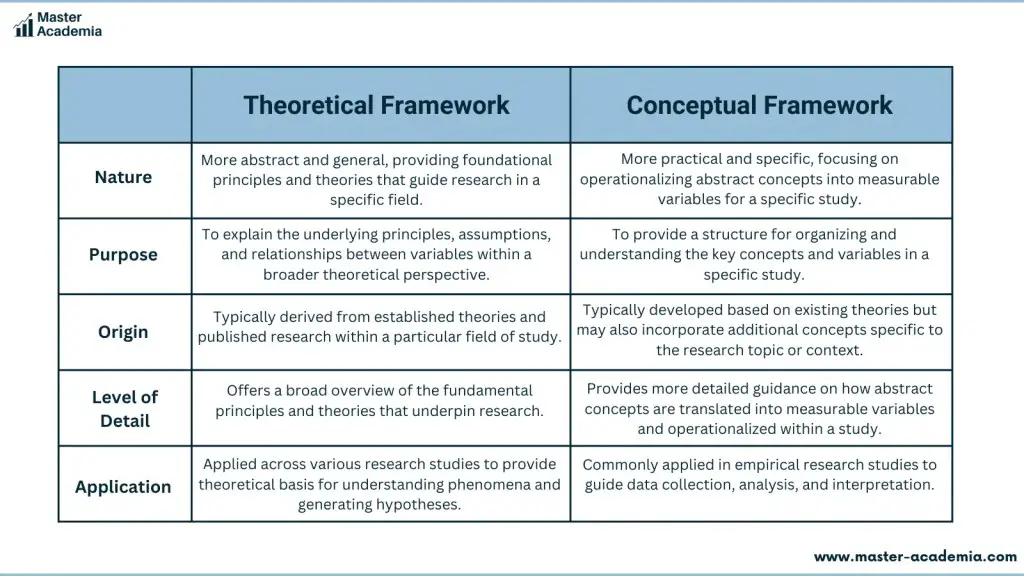
Understanding the differences between theoretical and conceptual frameworks in research, including thesis writing, can be challenging. Therefore, here are easy-to-understand explanations and definitions of both theoretical and conceptual frameworks, along with frequently asked questions and a detailed comparison. Additionally, a helpful comparison table of key differences will help you grasp the distinction between theoretical and conceptual frameworks once and for all.
Contents
An easily understandable definition of a theoretical framework
A theoretical framework forms the backbone of every new research endeavor; we never start from complete scratch but always have some preconceived ideas in mind.
In academic papers, the literature review section is sometimes even labeled as the ‘theoretical framework.’ This practice underscores the foundational role of existing theories and academic research in shaping theoretical frameworks.
Let’s first understand what a theory is. According to the Oxford Language Dictionary, a theory is “a supposition or a system of ideas intended to explain something, especially one based on general principles independent of the thing to be explained.” In simpler terms, a theory represents general principles or rules that apply to many situations.
Once we understand what a theory is, a theoretical framework becomes easy to define:
A theoretical framework can be defined as the general principles or rules that can be applied to understand and explain your research topic.
Thus, in research, a theoretical framework guides us by using existing theories and general principles to analyze a research topic.
We build a theoretical framework for our research by identifying relevant theories and presenting existing knowledge on the topic.
Does every research have a theoretical framework?
Every research includes a theoretical framework. While some researchers explicitly state and apply their chosen framework, others may not mention it overtly. Regardless, every research inherently relies on a theoretical foundation, which shapes new insights and principles based on existing knowledge. Whether implicit or explicit, the theoretical framework is an integral part of the research process.
What is the scope of a theoretical framework in research?
The scope of a theoretical framework varies. For instance, a theoretical framework for a PhD thesis is typically much more detailed than one for a bachelor’s thesis. Additionally, some researchers choose to use a single specific theory as the primary lens for their research. Others may define a more expansive theoretical framework that includes different theories, elements, and related discussions.
How do I develop a theoretical framework?
Developing a theoretical framework involves thoroughly reviewing discussions on your research topic, usually through a literature review. Explore the theories that scholars employ to explain phenomena related to your research, and look for patterns in their findings. This can aid in establishing general principles or rules that may also be applicable to your specific topic.
You may also like: How to harness theoretical and conceptual frameworks for groundbreaking research
An easily understandable definition of a conceptual framework
Theoretical frameworks often cover a broad spectrum of elements and dynamics. However, effective research is typically precise and focused. This is where conceptual frameworks play a crucial role.
A conceptual framework is like a practical version of a theoretical framework. It’s closely related to a theoretical model but gives a more focused explanation of what you will study, zooming in on several key concepts and variables.
Therefore, in academic language, it is often stated that a conceptual framework operationalizes the general principles of theoretical frameworks. Operationalizing refers to the process of turning abstract concepts or variables into more concrete, measurable terms.
Therefore, a conceptual model primarily helps you organize your research by serving as a guide, clarifying the key concepts you plan to investigate.
A theoretical framework relies more on existing research, while a conceptual framework incorporates more of your own ideas about which variables to analyze and which relationships to explore.
Does every research have a conceptual framework?
Every research project includes a conceptual framework, but some researchers emphasize it more clearly. In thesis writing, for example, the conceptual framework is often prominently featured. This is sometimes done in a conceptual model—a visual representation of the concepts and variables being studied. However, some researchers choose not to explicitly mention it. Nonetheless, as a student at any level, it’s beneficial to clearly explain your conceptual framework.
Do you develop a conceptual model for both quantitative and qualitative research?
Yes, you can develop a conceptual model for both quantitative and qualitative research. In quantitative research, the conceptual model typically includes hypotheses about the relationships between variables, which are tested for instance by using statistical analysis. In qualitative research, the conceptual model helps to guide the exploration of concepts and relationships through in-depth qualitative analysis of data. So, while the specific elements and methods of application may differ between quantitative and qualitative research, the conceptual model plays a crucial role in both approaches.
What is the relationship between a conceptual framework and a theoretical framework?
Conceptual and theoretical frameworks are closely intertwined. The conceptual framework translates abstract theoretical ideas into tangible elements for study, ensuring that the research remains grounded in established theories and hypotheses. In essence, the conceptual framework is built upon the theoretical framework, as it directly applies theoretical concepts to the research context, helping to structure and guide the investigation. Therefore, you should always ensure that any variable included in your conceptual framework has been addressed in some manner within your theoretical framework.
Key differences between theoretical and conceptual frameworks
In research, frameworks play crucial roles in guiding studies, but they differ in various aspects. Nonetheless, it is imperative to bear the following in mind:
Though distinct, conceptual and theoretical frameworks are not mutually exclusive; rather, they complement each other in the research process.
That said, understanding the fundamental distinctions between theoretical and conceptual frameworks, including their nature, purpose, origin, level of detail, and application, is essential for conducting good research.
In the table below, you can find a summary of the key differences between theoretical and conceptual frameworks. And if you want to know more about how to apply these frameworks in practice, check out this post.

Nature
Theoretical frameworks encapsulate abstract principles in a field, providing an overarching view of established theories that guide research. This is often achieved through a comprehensive review of existing academic literature and research findings within the field of study. Conversely, conceptual frameworks adopt a more hands-on approach, emphasizing practicality and specificity. They engage in the operationalization of abstract concepts, translating them into measurable variables tailored to the particulars of a given study.
Purpose
The primary objective of theoretical frameworks lies in explaining underlying principles, assumptions, and relationships between variables, thus providing researchers with a theoretical lens to interpret findings and generate hypotheses. Conceptual frameworks, on the other hand, aim to provide structure and understanding within the confines of a specific study. They offer researchers a roadmap for organizing and comprehending key concepts and variables, facilitating a more focused research journey.
Origin
Theoretical frameworks often originate from established theories and bodies of research within a discipline, offering a solid foundation upon which to build further investigations. Conceptual frameworks, while drawing from existing theories, are more flexible. They may introduce additional concepts specific to the research topic or context, thus allowing for customization and adaptability in research design.
Level of Detail
Theoretical frameworks provide a big-picture perspective, offering an overview of fundamental principles in a field. On the other hand, conceptual frameworks offer a detailed roadmap, guiding researchers on how to translate abstract concepts into practical variables for their study.
Application
Theoretical frameworks find application across various research studies within a specific field or discipline. They provide a theoretical basis for understanding phenomena and generating hypotheses, contributing to the advancement of theoretical understanding within the field. Conversely, conceptual frameworks are commonly employed in empirical research studies. They guide researchers through the practical aspects of data collection, analysis, and interpretation, laying a solid foundation for empirical investigations.



